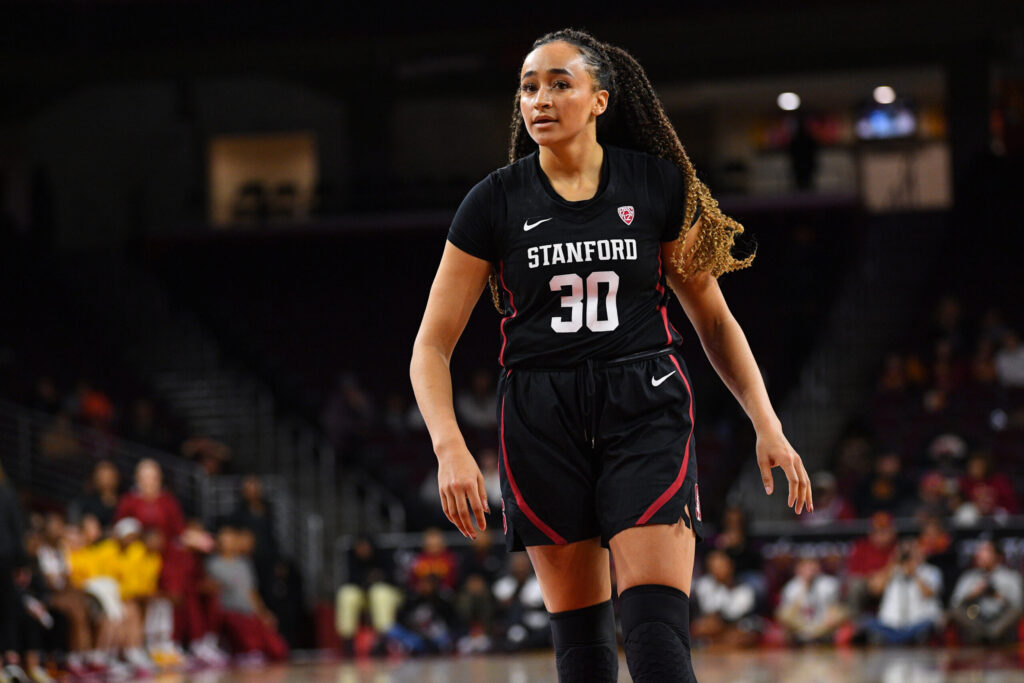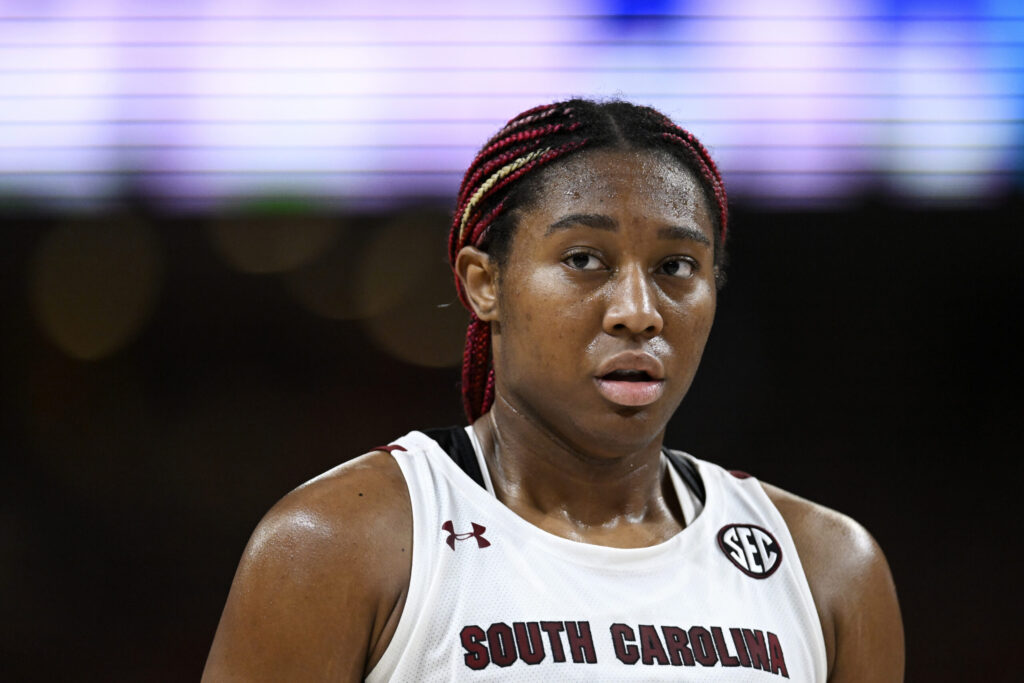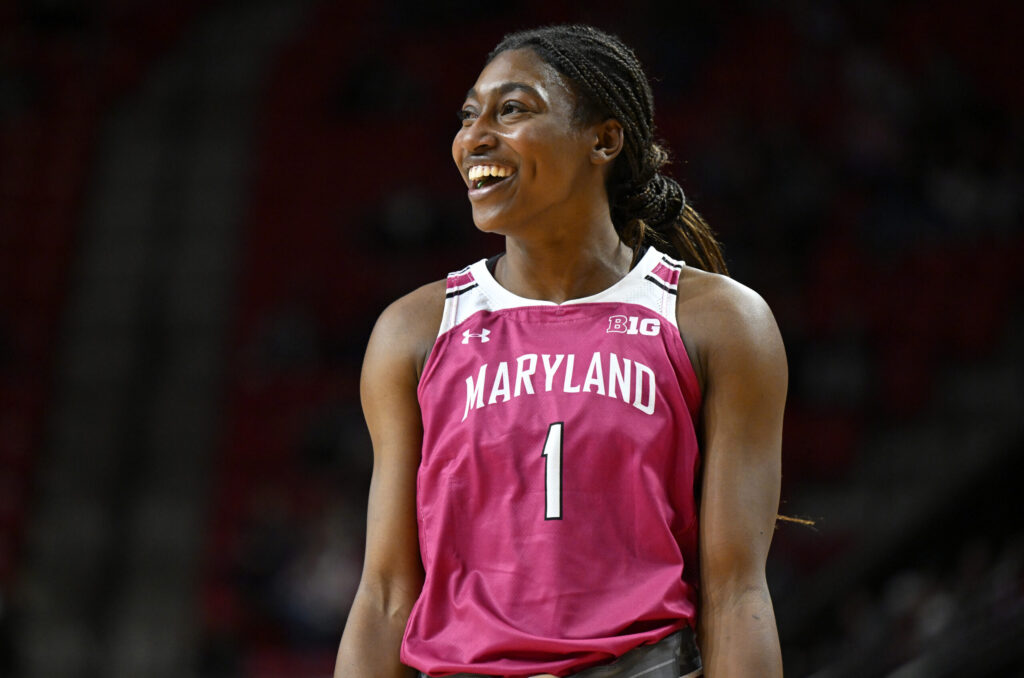When Haley Jones was being recruited in high school, several coaches tried to dissuade her from picking Stanford.
“You’ll get a Stanford degree, but you’ll never win a national championship,” they told her.
What they didn’t realize is you don’t tell Haley Jones she can’t do something. Their attempts to bring her to their programs only solidified her decision.
“I think I can do both,” Haley told them.
So, Haley committed to Stanford. And with poise and determination, she got the title. She’s about to get her degree, and before going out, she wants one more championship with the Cardinal.
She never feared failure. Not then, not now. Not even when she was a little girl.
Her parents, Monique and Patrick, were both high school basketball coaches. Haley’s introduction to basketball came on the sidelines, where she would goof around with her older brother, Cameron.
Eventually, she graduated to participating in drills and watching intently as her parents drew up plays.
Then, one summer, Monique had her team playing in a tournament. They were short on players, so she asked the opposing coach if Haley could fill in.
He looked at the little girl and asked her: “Are you sure?”
By the end of the game, Monique’s high school players were chanting, “HA-LEY, HA-LEY, HA-LEY,” as she dominated the competition.

When the final whistle blew, the opposing coach approached Monique with a bewildered look on his face.
“How old did you say she was?” he asked.
Haley was 10.
It was then that Monique knew. Her little girl could handle anything.
Every day since then, Haley has approached her life, on and off the court, like she did that game: Like a 10-year-old giving buckets to a 17-year-old.
Without fear.
***
Haley’s childhood was centered on movement.
She had a never-ending supply of energy, so Monique and Patrick were always searching for ways to tire her out.
Monique remembers her husband researching trampolines when Haley was little. He knew it would be a good way for Haley to expend some energy, but he also wanted the safest option.
They settled on one that was enclosed, with high nets, so Haley couldn’t hurt herself. Patrick stuck it in the backyard where they could see it from the kitchen window. Then, in the evenings, they’d flip on the light and watch as Haley jumped for hours.
They also enrolled Haley in gymnastics, unaware that she would grow to be 6-foot-1, and the sport became Haley’s first passion.
But by the time she was 9, Haley already had size eight feet that barely fit on the balance beam. She knew she would have to give it up, but Haley didn’t simply quit. She went out a winner.
Haley always excelled at her tricks, but little mistakes kept her from taking first in her meets. Monique laughs when she recalls how Haley would run off the mat, forgetting to cap her routine with a salute, only to be reprimanded by her coach. She’d run back smiling, salute and run off once more.
So when it came time for her final meet, Monique expected more of the same. She and Patrick had to take Cameron to one of his many activities, so they asked Haley’s grandmother to accompany Haley to her last meet.
When it was over, Monique got a phone call from her mother-in-law. Haley had won the whole meet, then apologetically told her coaches that she would no longer be pursuing gymnastics.
“I went out as a state champion,” Haley says with a laugh.
And when her time in a leotard came to an end, Haley didn’t mourn its loss. Instead, she turned to other sports and activities: water polo, soccer, junior lifeguarding, swimming, golf, volleyball and, of course, basketball.
Patrick and Monique are high school sweethearts who met when Monique moved to California from Georgia. They both played basketball, and as their relationship progressed, so did their involvement in the sport. They worked together as high school coaches until Haley started ninth grade.
Through her parents, Haley became interested in the game on a level that transcended simply burning energy. By the time the 10-year-old was filling in during summer scrimmages, she was also a student of the game.
In the evenings, Monique and Patrick would sit at the dinner table drawing up plays, and Haley and Cameron would join. They used a specific teaching style: “Say it, see it, do it,” that allowed their kids to fully grasp whatever concept the two were working on. They taught them things like Read and React and the Princeton offense.
Then, when Haley got to basketball practice, she wanted to polish her new skills. But her parents never dumbed anything down for their kids.
“You think we are going to lower the hoop? No ma’am. There is no lower the hoop,” Monique says. “You’re strong enough, you’re going to work on this.”

They practiced right-handed layups, left-handed layups, free throws, 3-pointers, dribble moves. Anything and everything that Haley could learn, she did with ferocity. And when Monique was short on players, it was always Haley she called on to fill in.
She remembers watching Haley run her team’s offense when she was in elementary school. Haley dribbled across halfcourt and proudly called out the set, her little-kid voice echoing throughout the gym.
Haley spent a lot of her time training with the high-school girls even though she couldn’t actually compete with them. At 10, she was already better than girls who were years older than her, and by middle school, Haley was well on her way to competing with USA Basketball and becoming the country’s top high school recruit.
The discrepancy between Haley’s talent and her teammates’ was obvious, but she never cared.
In middle school, Haley attended a small, Catholic school. Her eighth-grade class had 16 students — eight boys and eight girls — and in order to field a basketball team, all eight girls had to play. Some of them had never touched a basketball before.
One girl had a habit of tying her shoes while her team was in the middle of a fast break. Haley would call out to her, never in anger but with encouragement: “Come on,” she’d say, “You can do this!”
In those games, it was Haley’s mission to get every player a basket. Sometimes she’d have to grab six offensive rebounds on one possession, but to her, that was no trouble.
“She would literally be spoon-feeding her teammates under the basket,” Monique says with a laugh.
Despite appearances, Haley was already a fierce competitor. But she knew there was a time and a place for it.
Going at someone who wasn’t on her level, or screaming at teammates who’d never played basketball before didn’t make sense. Haley knew how to turn it on and off.
Unless someone tried to take advantage of one of her teammates. Then it was game on.
“If someone is trying to get their shine by taking on the complete underdog, then Haley is going to completely go after you,” Monique says.
***
By the time Haley was 16, every college in the country wanted her on their team. Today, positionless basketball is more commonplace in the women’s game, but back then, Haley was being heralded as one of the first truly positionless players.
At 16, she was already changing the game.
“She’s like a unicorn in women’s basketball,” says roommate and former Stanford player Jordan Hamilton. “She can play one through five, and she’s a great basketball player because she doesn’t put herself in a box.”
Nowadays, if you watch Stanford, every time a player subs in, Haley looks to the bench to find out what role she will be taking on in the current lineup. With one substitution, Haley can go from running the point to posting up inside.
If there was one word to describe Haley Jones, “versatile” might be it. And not just because of what she does on the basketball court.
Since she was little, Haley was never concerned with specializing. And even when the world was looking at her as the best basketball player in the country, Haley didn’t see herself as a basketball player.
The idea that there is more to her life than what she does on the court is freeing to Haley.
“I never get caught up in one thing,” she says. “If I play a bad game, I’m never like, ‘I need to lay in my bed for two days because I’ve got nothing.’ It’s like, OK, the ball didn’t go in. But you have practice tomorrow and you can get it together tomorrow.”
Haley says she “hates losing more than she loves winning,” but she doesn’t let losses define her. Still, there are some that have stuck with her.
There is still minor annoyance in her voice when she brings up the fact that she never won a state championship as a high school basketball player (apparently the third-grade gymnastics title wasn’t quite good enough).
And Stanford’s loss to UConn in last year’s Final Four hurts her. The Cardinal missed out on a chance to compete for another title after one of their worst shooting performances of the season resulted in a 63-58 loss. They made just 34.8% of their attempts while shooting 17.4% from the 3-point line and 61.5% from the free-throw line.

Haley still remembers her interview with Holly Rowe at halftime of that game.
Addressing her as “Miss Holly,” Haley didn’t hold back.
“We just played our worst half of basketball all season and we are only down one,” she said.
Haley went into the locker room and relayed the same point to her teammates.
“I’m like, ‘Ladies, that sucked, and we are down one point. If we play 1% better, I bet we can pull it off,’” she recalls. “But they rose to the occasion and we didn’t. And that made it tough to swallow.”
There’s so much to learn from losses, Haley says.
After losing her final game in high school, she used it as motivation heading into her freshman year at Stanford. Last year’s tournament loss taught her to never let the buzzer sound on regrets.
“Personally, I felt like I had more to give, whether that had been defensive aggressiveness, diving on the ground for loose balls, playing through contact,” she says. “I felt like I had more in the tank. This season, I’m leaving it all out there.”
It’s already been a challenging season, with seven Pac-12 teams earning bids to the NCAA Tournament, setting a new record and showcasing the depth of the conference. Last year, Stanford went into March Madness after going undefeated in conference play and winning the Pac-12 tournament. This time around, Stanford dropped three games in conference (to USC, Washington and Utah) and exited the Pac-12 tournament early, with a semifinal loss to UCLA.
Coach Tara VanDerveer and Haley have similar approaches when it comes to the challenges of losing. There is more to be gained than lost in a defeat.
“I feel like we are really ready for the tournament because of the great competition in the Pac-12,” Vanderveer said during a SiriusXM radio interview on Tuesday.
The difficult conference slate created more opportunities for growth, and that’s something Haley will never shy away from.
In high school, she commuted nearly an hour from their home in Santa Cruz to Archbishop Mitty in San Jose. It was the best opportunity for her to learn and grow as a student and a player, so she took it.
When she got to Stanford, Haley latched onto the older, more experienced players. She learned everything she could from people like Anna Wilson and Nadia Fingall, both of whom she still seeks out for advice today.
Wilson taught her about hard work, perseverance and playing with passions. Fingall was the motherly figure on the team, always making sure the younger players had rides when they needed them and someone to talk to if they were homesick.
Now, Haley talks about Wilson and Fingall in the same way Haley’s teammates talk about her. And in her four years, Haley’s natural leadership skills have grown even stronger.
“She always knows what a person needs,” Hamilton says. “So if she has a teammate that needs extra study sessions, she’s going to go with her. If there is a teammate who needs to see her lead by example, you’ll see her coming out of practice with bruises from diving on the floor.”

Haley gets a lot of that from her parents, who are educators by nature and by trade. And part of teaching is learning how to approach each person. Haley uses different leadership styles depending on which teammate she’s interacting with. Some like it when she gets in their face, others need a more gentle approach. Haley is open to anything. Whatever is best for them and for the team works for her.
She is also big on feedback. If she and a teammate don’t connect on a pass during practice, there is no moving on to the next play and forgetting about it. Haley wants to know why it happened.
“Did I throw it too high? Too far? Too hard? How can we make it work next time?”
It’s never, “You messed up;” it’s, “How can we fix this together?”
***
A perfect day for Haley must have three things: a new food, a new activity and stimulating conversation.
Like exploring a new dumpling spot in San Francisco, and then falling on her butt while roller-skating. She’ll end the day talking to her favorite people. No small talk, though — Haley wants to know about existential crises and how people choose to exist in the world.
Her life is all about learning.
“All my hobbies revolve around me trying new things,” she says.
Lately, Haley has gotten into baking. She makes chai banana muffins and has perfected a cinnamon roll recipe so good that she says her mom stole it.
She journals at night, and her favorite part of the day is her skincare routine. In school, Haley’s favorite class is Arabic — though her mom jokes it’s just because she can say whatever she wants without her parents catching on.
Recently, Haley has started to expand the business side of her life as well.
She hosts a podcast with The Players Tribune, called “Sometimes I Hoop,” where she has guests from her friend and South Carolina player Aliyah Boston, to Monique and other basketball moms. Haley is studying communication, with the hope of going into broadcasting someday.
And like most things in her life, Haley has a talent for it.
There aren’t many things she’s bad at. Bowling comes to mind, though that’s only partly true because, according to Hamilton, Haley can get on a roll where she scores only strikes and spares.
The senior finds joy in music and associates different songs with different moments in her life. Gospel music means cleaning. That’s what played growing up when her mom knocked on Haley’s bedroom door, vacuum in hand. When she hears Stevie Wonder, Haley thinks of her dad — his music of choice during car rides to games or events.
Curating playlists for friends is one of her love languages, but singing is something she’s actually bad at.
“I’m tone deaf,” Haley says with a laugh.
But she only knows that because she’s tried it. That’s another thing about Haley. She lives without fear of failure. And that has led her to discover so many passions, and so many talents.
That’s a big reason why Haley picked Stanford.
“I’m not going to play basketball for 50 freaking years, and who would want to?” she says with a laugh. “There are so many things I’d love to do and love to try. I don’t want to get caught up in just one thing.”
Through all her new experiences, there is one thing Haley refuses to do, and that’s be disingenuous. From her “winning hair,” as she calls it— Haley wore the long, bouncy tendrils when Stanford won the title in 2021, so now she keeps it all season — to her social media accounts, Haley is proud to be authentically herself.


She won’t take an NIL deal or a partnership if “the vibes are bad,” or if she gets the sense that a company just wants to use her name but doesn’t want to hear her input. And her social media strategy is the same as it was when she first created accounts in her early teens.
“I don’t curate my content,” Haley says. “For me, when I think about when I first got social media when I was in seventh or eighth grade, it was a place for me to connect with my friends and show them what I was doing. And as social media grew, I think that kind of left for a lot of people, but I’ve tried to keep it as the main reason I use it.”
She also knows that part of being a basketball player today is having a platform and using it. For Haley, that means representing young Black and biracial kids, particularly young girls. It’s a big responsibility, but one she takes great pride in.
It’s a part of her life she’s long been aware of. Patrick is white and Monique is Black, so as soon as their kids were old enough to understand, they started having conversations about race and society.
“Haley loves her dad and takes pride in her dad,” Monique says. “She embraces that she is a biracial, mixed female, but, when society looks at her, they see a Black female. And that means she has to work twice as hard.”

It also means less room for mistakes, something Haley feels every time she posts on social media.
“I understand that the way I am taken is going to impact how these young Black kids behind me are taken,” she says. “That is a big weight on my shoulders, but it’s one that I invite and embrace.”
***
Haley’s older brother, Cameron, has always been her fiercest supporter. When they were growing up, kids would try to make fun of him by pointing out that Haley was the athlete of the family.
He didn’t care.
“Yeah she is,” Haley remembers him saying. “And you’re jealous.”
Then, when they got to high school, none of Cameron’s friends watched girls’ basketball. He changed that quickly by bringing them to all of Haley’s games. Now, as an assistant coach at Colorado College, he hosts Stanford watch parties for his players, so they too can see the wonder that is Haley Jones on a basketball court.
Haley has always known that no matter what was going on in her life, Cameron would have her back. She may be fearless, but he’s also her safety net.
On Feb. 20, Haley celebrated Senior Night at Stanford with a signature performance, scoring 18 points, grabbing six rebounds, recording three steals and blocking a shot.
Cameron flew in from Colorado Springs for the occasion.
Haley had no idea he was coming. When she laid eyes on her brother, she started to cry.
And he wasn’t the only one who showed up for her.
Her best friend flew in from UCLA. Cameron’s friends from high school, who all grew to love Haley like their own little sister, were there, too. Even her kindergarten teacher showed up.
In total, 150 people were in the stands, just for her.
“She’s touched so many people,” Monique says.

In four years at Stanford, Haley has won a national title, and in the next month, she hopes to win another. She’s been a starter and a key contributor in all four seasons, doing a little bit of everything for the Cardinal.
She’s helped bring positionless basketball to the forefront of the women’s game, and in April she’s projected to be a top-five draft pick in the WNBA.
Her already long list of accomplishments is just the beginning.
There’s nothing she won’t try, and nothing she can’t do.
That’s the power of Haley Jones.
Eden Laase is a Staff Writer at Just Women’s Sports. Follow her on Twitter @eden_laase.



